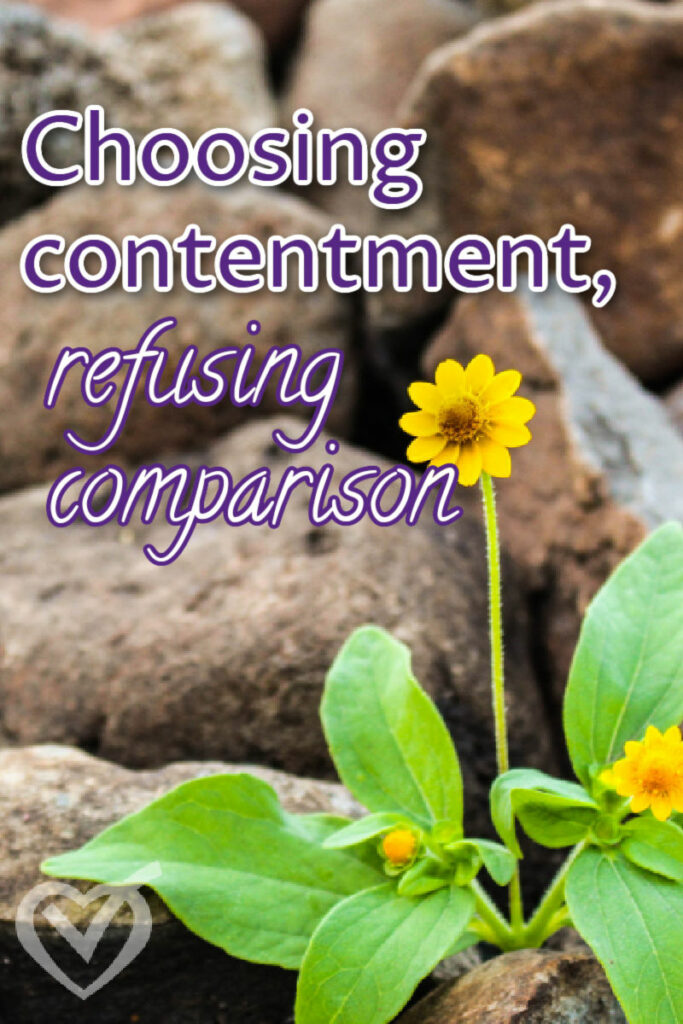Choosing contentment, refusing comparison
We always want to know how we’re doing, but instead of looking to our responsibilities and honestly assessing ourselves, we look sideways and compare ourselves to others.
Comparing ourselves is bad enough, but then we end up actually comparing ourselves to a false version of others: the version they present on social media.
We scroll, and each photo adds another piece to the puzzle, building the image of the ideal life. This picture not comes from seeing one person’s life in its entirety, but from seeing the best parts of hundreds of people’s lives and weaving them together into a composite vision.
Such is the way to envy, resentment, and discouragement.
God calls us instead to contentment.
“Christian contentment is that sweet, inward, quiet, gracious frame of spirit, which freely submits to and delights in God’s wise and fatherly disposal in every condition.”
Jeremiah Burroughs, The Rare Jewel of Christian Contentment
Growing in contentment is part of growing in maturity and grace in Christ and it is not an end-point we will attain during this life. It is a grace we can always be growing in – and will always be given opportunities to grow in.

As with all virtues, contentment does not come easily or naturally for us. When we think we are naturally content or patient or gentle, we often find the truth is that we simply haven’t been tested in that area yet.
Our need for contentment
Testing in contentment does come, however. It comes in the cyclical, repetitive nature of housework. Will we be content to do the work day in and day out?
It comes when our families and homes are not what we thought we’d have and our parenting is not what we imagined it would be.
We find it hard to be satisfied with the place God has called us to. Our satisfaction levels can often feel like a roller coaster, high when we get a lot done and then low the next day because we’re exhausted.
Contentment is being satisfied or pleased with where God has us right now. Yet there is still room in a contented heart for growth.
Discontentment leads me to repentance, which helps me see things “rightly” again. This translates to momentum, because when I can see clearly then I know which steps to take.
Amanda Sewell, Simply Convivial mentor member
Contentment doesn’t mean being happy with status quo with wanting everything to stay the same as it is right now, forever and all time. We are supposed to be continually learning and growing.
After all, God changes our situations and our seasons and our circumstances and sends us different struggles and trials and blessings. Status quo is not God’s plan, but contentment knows that God does have a plan he is working and we are willing to follow where he leads in his way and his timing.
So contentment doesn’t mean assuming everything’s going to be like it is right now and being good with that. Rather, it’s being good with where God has us right now.
“Contentment is complete satisfaction with the will of God.”
Bessie Wilson, Learning Contentment
Insights about contentment
Comparing ourselves to others will feed envy and deny us contentment. We must always remember that there are and will be differences between people.
We aren’t created to be cookie cutter copies. We aren’t all given the same gifts. We aren’t given the same circumstances, the same callings, the same responsibilities or the same energy.
There is confusion in the world today about the word equality and equality as a goal. Most today define equality as sameness, but that is wrong and unbiblical. We have equality before God as individuals – equal worth and value as persons before God who will each one stand before him and answer for our lives.
All who are covered in Christ’s blood and righteousness will enter God’s presence, regardless of their status in this life or the length or progress of their sanctification. All who do not have forgiveness and justification, regardless of earthly wealth or status or worldly good deeds, will depart to eternal judgement. This is equality in God’s economy.
God tells us that he gives different people different amounts of things and different places in society and different struggles and different trials. Yet no matter which circumstance you find yourself in, we all have the same purpose, which is to glorify God.
We find contentment not in having the same or better than anyone else, but in serving God.
Contentment is an attitude of the heart that not only can be thankful for what is provided by the Lord, but embraces limitations set by Him. It’s resting and trusting the fact that everything you NEED (not want) will be provided and not looking at what anyone else has as a measure of success or happiness.
Leah T., Simply Convivial member
“For me, contentment has become a practice of gratitude to the Lord for where I am now, even if I have hopes and desires for things in the future. I love the idea of turning the waiting room into a classroom. Learning and growing in my current season helps me to be more content.
Jess Smith, Simply Convivial mentor member
Also, I have come to accept that current limitations give me clear boundaries within which to grow now. I’ve actually learned these lessons most vividly through taking up gardening over the last couple of years.”
I have a quote on my wall, that my youngest has played with, but it’s still readable. “You can’t change the beginning, but you can start where you are and change the ending.” C. S. Lewis said it (he’s a very smart man). ????
I have lots of things I am currently discontent about in some form or other. I can’t fix past issues but I can work where I am now with what I have and do my best. Because of that, I make small progress. It changes little things.
I was reminded of another quote “If you take care of the small things, the big things take care of themselves” – Emily Dickinson. Small changes add up. This takes a lot of practice (especially for me).
Laura Brown, Simply Convivial member
This morning I thought of another metaphor–relating our time and talents to that of a painting. An artist recognizes that often it is the little details, such as a small highlight here or there that makes a masterpiece. Just because it is slight and often goes unnoticed to the average viewer, it is not any less important to the overall impact of the painting than that of the focal subject. So, too, it is in life. Whatever you can do, do it to the glory of God.
Karen Head, Simply Convivial mentor member
If I have reasonable expectations, I am satisfied. Most of my dissatisfaction comes from misguided expectations.
Sarah Nelson, Simply Convivial mentor member









